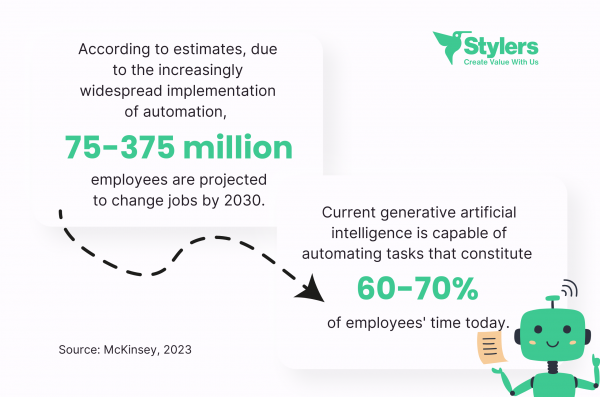It is estimated that with the increasing roll-out of automation, between 75 and 375 million employees will change jobs by 2030, but they will have to acquire new skills with certainty. Current genetic AI has the potential to automate functions that today account for 60-70 per cent of employees’ time (McKinsey, 2023). These projections are a cause for concern among workers, who fear that they might lose their jobs. How does the job of the future look like, what happens to the inspirational person and how should we redefine the concept of workforce? We talked with Eszter Debreczeni (HR and organisational expert) and Silur (world-famous ethical hacker and cryptographer) in the Protechtor podcast, who believe that AI does not take away but rather reshape our vision of work.

We will all need creative visions on how we organise and value our lives in the future, in a world where the role and meaning of work is changing.
The big change is that AI arrived at the table of the normal person.”
Although we have been covered by these technologies, such as Netflix, Spotify or social media website algorithms, which offer users personalised content. We have been able to do so, but now we are starting to understand at our own level what can be influenced and that employers can also benefit from them. We are not yet aware of how much we will use to build a consensus in society, based not only on the narratives of a few larger tech companies, and how much we are in the direction of colonisation.
The notions of value creation and labour are given a completely new meaning, because it is already clear that if someone wants to be modern and competitive, it is not possible to define work only for people.”
With AI, up to 30 % to 50 % of jobs can be performed faster, so it is necessary to decide what to start with the released productivity. Rather than reducing human capital, it is preferable to transform the workforce so that processes that have not been value-creating so far can be transformed into valuable ones. This means that we can be more innovative, more customer-oriented or simply put in a better position on the market.
Bringing human knowledge to a new level
According to Eszter, many companies feel tightened by AI and want to compete, and are confronted with questions on how to put the machine at the service of people in a way that works as efficiently as possible. Believes that equilibrium will be the ability to separate quality and productivity between AI and humans. Silur also sees a new interpretation of the concept of quality, i.e.: who counts as good programmer or graphic. Indeed, the concept of ‘good’ includes how someone can work effectively with machinery.
It is not just the machine that learns, but is also taught by humans. A new quality emerges in informatics, where we do not use AI as data to sum up, solve problems, but to help resolve our thoughts. Knowledge has come where we give him input in one way or another and have a responsibility for what it learns and how. Genetic AI should therefore be seen as a tool to support our thinking, providing suggestions and perspectives that bring creativity to a new level. This is an iterative process in which people are portrayed to decide whether or not to accept the first generated response. There are many creative people who simply cannot express their ideas. This is where AI enters, creating an opportunity for the solution," Eszter added.
There are no positions in the workplace of the future; there is work. When working with machines, soft skills are highly appreciated, looking for a well-informed workforce, selecting partners with whom we would like to work together and then decide with whom, how we can cooperate and who can contribute to value creation. If we move in this direction, we can become truly future-proof.
Operating responsibly and AI
Technology is changing rapidly and the regulatory environment is not ready for this pace, so no consensus has yet been reached for all. More than 60 % of firms do not have any AI policies, while there are also companies where ChatGPT has not been allowed to introduce to avoid sensitive business information.
It is certain that long-term, good business conduct is responsible AI, where competitiveness is supported by decisions that do not endanger our own community and the future of our world. We should manage our own resources while keeping the balance between innovation and regulation and redefining the principles of ethical functioning.
In conclusion, should we fear that AI will take off our jobs?
Silur responds to this tensioning question through the example of self-driving cars. It will be a huge innovation if these vehicles are on the street, but he says that we will never be able to sit without a licence, as there will always be a person who can be returned to the government immediately if there is a trouble. This will work in a similar way to AI. Moreover, the introduction of technology will also create new jobs.
